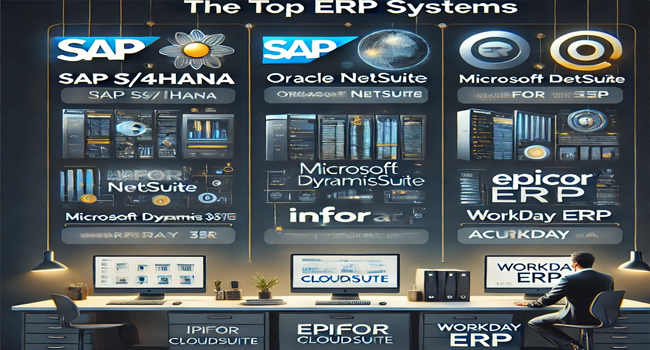The Best ERP Systems: A Comprehensive Review
Enterprise Resource Planning (ERP) systems are essential tools that integrate various business functions into a single system to streamline operations, improve efficiency, and provide real-time insights for decision-making. Over the years, ERP solutions have evolved to include cloud-based and AI-driven capabilities, making them more powerful and adaptable than ever.
In this article, we explore the best ERP systems available, analyzing their features, advantages, disadvantages, and suitability for different business needs.
1. SAP S/4HANA
SAP S/4HANA is one of the most widely used ERP solutions, trusted by large enterprises across the globe. Built on SAP’s in-memory database technology, it offers real-time data processing and analytics.
Key Features:
- Real-time analytics with SAP HANA database
- AI and machine learning integration
- Robust financial management tools
- Industry-specific modules
- Seamless integration with other SAP products
Pros:
- High scalability and customization
- Advanced automation and AI capabilities
- Strong community and vendor support
Cons:
- High implementation cost
- Steep learning curve
- Requires significant IT resources
Best For:
- Large enterprises in industries like manufacturing, retail, and finance
2. Oracle NetSuite
Oracle NetSuite is a cloud-based ERP system known for its flexibility and comprehensive suite of business applications, making it popular among mid-sized businesses and enterprises.
Key Features:
- Financial management and accounting
- Inventory and supply chain management
- Customer Relationship Management (CRM)
- E-commerce integration
- Cloud-based deployment
Pros:
- Highly scalable
- User-friendly interface
- Strong integration with third-party applications
Cons:
- Higher cost compared to some competitors
- Limited customization in certain areas
- May require third-party consultants for setup
Best For:
- Small to mid-sized businesses looking for a cloud-based solution
3. Microsoft Dynamics 365
Microsoft Dynamics 365 is a cloud-based ERP and CRM solution designed for businesses looking for a highly integrated system with Microsoft’s suite of products.
Key Features:
- AI-driven insights and automation
- Sales, finance, and supply chain management
- Business intelligence and analytics
- Seamless integration with Microsoft Office 365 and Azure
- Customizable modules
Pros:
- Easy integration with Microsoft products
- Strong AI and data analytics capabilities
- Flexible pricing and deployment options
Cons:
- Requires strong IT knowledge for customization
- Can be expensive for small businesses
- Limited support for non-Microsoft applications
Best For:
- Businesses already using Microsoft products
4. Infor CloudSuite
Infor CloudSuite is a cloud-based ERP solution designed specifically for industry-specific needs, making it a popular choice in manufacturing, healthcare, and distribution.
Key Features:
- AI-powered analytics and automation
- Industry-specific modules (e.g., manufacturing, healthcare, distribution)
- Cloud-based architecture
- Advanced supply chain management
- Strong mobile access
Pros:
- Tailored for specific industries
- Cloud-first approach enhances accessibility
- Strong automation and analytics capabilities
Cons:
- Expensive for small businesses
- Customization can be complex
- Support response times vary
Best For:
- Manufacturing, healthcare, and distribution businesses
5. Epicor ERP
Epicor ERP is designed for small to mid-sized manufacturers and distributors, offering deep industry-specific functionality.
Key Features:
- Production management
- Supply chain and inventory control
- Financial and project management
- AI-powered analytics
- Cloud and on-premises deployment options
Pros:
- Strong focus on manufacturing and distribution
- User-friendly interface
- Good customization options
Cons:
- Higher initial implementation costs
- Requires skilled IT support for maintenance
- Limited global reach compared to SAP or Oracle
Best For:
- Manufacturing and distribution companies
6. Workday ERP
Workday ERP is an excellent choice for businesses focusing on human capital management (HCM) and financial management. It is widely used in education, healthcare, and finance sectors.
Key Features:
- Human capital management (HCM)
- Financial management and reporting
- Payroll and workforce planning
- AI-powered analytics and automation
- Cloud-based deployment
Pros:
- Strong HR and finance functionality
- Intuitive user experience
- Frequent updates and improvements
Cons:
- Limited third-party integrations
- Expensive for small businesses
- Customization can be challenging
Best For:
- Businesses focused on HR and finance management
7. Acumatica
Acumatica is a cloud-based ERP solution aimed at small and mid-sized businesses, offering flexible pricing models and a range of industry-specific applications.
Key Features:
- Financial and project accounting
- CRM and customer management
- Supply chain and inventory management
- Cloud and hybrid deployment
- AI-driven business intelligence
Pros:
- Flexible and scalable
- Cost-effective compared to larger ERP solutions
- Strong customer support
Cons:
- Requires third-party tools for advanced analytics
- Fewer pre-built integrations compared to larger ERPs
- Can be complex for first-time users
Best For:
- Small to mid-sized businesses looking for a cost-effective ERP
Conclusion
Choosing the right ERP system depends on the size of your business, industry, budget, and operational needs.
- SAP S/4HANA and Oracle NetSuite are best suited for large enterprises requiring powerful and scalable solutions.
- Microsoft Dynamics 365 offers excellent integration with Microsoft products, making it ideal for businesses already using Microsoft tools.
- Infor CloudSuite and Epicor ERP cater to industry-specific needs, particularly in manufacturing and healthcare.
- Workday ERP is perfect for organizations focused on human capital management.
- Acumatica provides a flexible and budget-friendly solution for small to mid-sized businesses.
When selecting an ERP system, businesses must consider factors like deployment options (cloud-based vs. on-premises), integration capabilities, scalability, and overall cost. Conducting a thorough evaluation and consulting with ERP providers can help ensure the best choice for long-term success.
